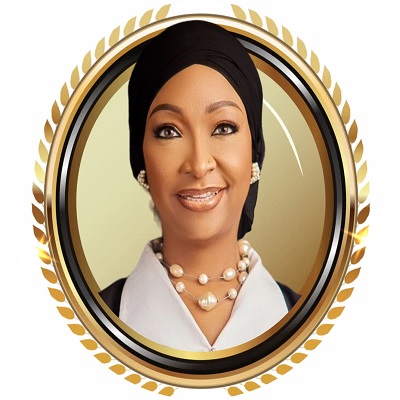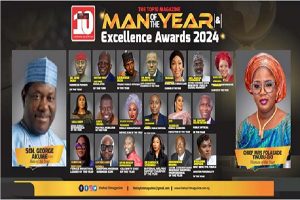Hon. Hanatu Musawa, Minister of Arts, Culture, Tourism & Creative Economy
THE TOP10 MAGAZINE FEMALE PUBLIC SERVICE GAME CHANGER OF THE YEAR
Hon. Hanatu Musawa is one of the young Nigerian professionals brought in by President Bola Ahmed Tinubu to breathe fresh air into governance and anchor his Renewed Hope Agenda for Nigeria. So far, the 50-year-old lawyer, politician, and author from Katsina state has distinguished herself by setting the newly-created Ministry of Art, Culture and the Creative Economy (MACCE) on a solid foundation and chatting a well-defined trajectory towards achieving the core mandate of the ministry.

The ministry which emerged from the consolidation of the erstwhile Ministry of Tourism and Ministry of Arts and Culture has the responsibility for harnessing the synergies between art, culture, tourism, and the creative economy to uplift communities, create sustainable jobs, and boost Nigeria’s economy and standing on the global stage. In numerical terms, the ministry is charged with the ambitious task of raising the sector’s contribution to GDP from $5 billion to $100 billion by 2030, and to create two million jobs.
The minister began by deploying an audacious and transformative vision for Nigeria’s creative economy, bolstered by strategic plans grounded in action and innovation and, in less than two years, the results have been manifesting in the form of many tangible and measurable milestones. For instance, the creative economy’s contribution to Nigeria’s GDP has surged from 1.3% when she took office to an impressive 2% by the end of Q2 2024. This growth, equivalent to approximately N420 billion, not only exceeds the Federal Government’s target of 1.8% for the entire year but also reflects a remarkable increase of over 50% in nominal terms, showcasing effective policy execution. The rise is reinforced by the registration of around 23,000 new start-ups in the Cultural and Creative Economy between January and June 2024, as reported by the Corporate Affairs Commission.
As part of its skills acquisition initiatives, FMACCE, as at September 2024, established cultural and creative learning platforms, successfully training about 7,500 individuals at the end of Q2 2024, with a target of 25,000 by year’s end. The ministry under Musawa’s leadership has secured a $200 million financing facility from the Africa Export-Import (AFREXIM) Bank aimed at supporting the new initiatives for the creative economy. She also got the National Arts Teatre, Iganmu, Lagos, renovated by the Nigeria Bankers’ Committee as part of the infrastructure deliverables of the ministry. As of 2024, the ministry reported a 36 per cent increase in Nigeria’s Cultural Influence alongside an 18 per cent increase in the Brand Perception Index, reflecting the positive reception of Nigeria’s cultural diplomacy efforts on the global stage.
Supported by the expertise of the Boston Consulting Group (BCG), a leader in strategic advisory with a rich history of steering economies towards unprecedented growth, the ministry has designed and is implementing an eight-point agenda, dubbed Destination 2030 (D2030), that boldly aspires to position Nigeria as the world’s hub for creativity, culture, and entertainment. BCG’s comprehensive evaluation of the sector, benchmarked against international standards, laid the groundwork for FMACCE’s 14 actionable initiatives, each underpinned by detailed implementation plans. The initiatives focus on technology, funding, infrastructure, and the promotion of international culture, and others
The ministry under Musawa is forging cohesive engagement and governance frameworks that foster collaboration between local stakeholders, creating synergy across agencies, academia, the private sector, and creatives. Through 27 separate stakeholder engagement events and strategic workshops, the Ministry has ensured that its policies and programmes resonate with the creative community’s needs, fostering an environment conducive to growth.
The minister introduced the Creative Leap Accelerator Programme (CLAP) which aggregates resources and facilitates democratized access to training, funding, and networking within the creative sector. The programme, along with the data collection strategy, exemplify the ministry’s commitment to skills acquisition and enrich its data-driven decision-making capacity, and enabling speedy responses to domestic and international market trends.
The capacity building and job creation ambitions of the Minister are supported by an effective partnership with BigWin philanthropy that mimics successful models that have created jobs across Africa, including 500,000 in Rwanda, a country with a much smaller population than Nigeria. This collaboration is developing a tailor-made strategy that aims to deliver two million jobs by leveraging regulatory frameworks, strategic investments, and incentives while aligning with Nigeria’s commitments under the African Continental Free Trade Area.
Musawa’s collaborative approach, notably with the Nigerian Economic Summit Group (NESG) has yielded a Memorandum of Understanding focusing on critical policy areas including National Intellectual Property Rights and The Cultural and Creative Economy. There is also a separate Fiscal & Tax Incentives policy tailored for the creative economy. These frameworks are poised to unleash economic potential, enabling creatives to monetize their innovations and secure financing against intellectual property (IP) assets.

In the hitherto largely ignored Heritage sphere, there is a long list of wins: securing the inscription of the Sango Festival on the UNESCO List of Intangible Cultural Heritage; accrediting Asaba Film City as part of the UNESCO Creative Cities Network; quadripartite agreement with notable institutions to preserve and celebrate the Sukur UNESCO World Heritage Site; and securing UNESCO’s Intangible Cultural Heritage of Humanity recognition for ‘Midwifery: Knowledge, Skills & Practices’. The latter underscores the Ministry’s dedication to preserving traditional healthcare practices and highlights the vital role of midwifery in enhancing community health and well-being.
Apart from the renovation of the National Arts Theatre, the minister plans a public sector-driven vehicle that will focus on infrastructure development, refurbishment of multiple museums in partnership with National Commission for Museums and Monuments, National Council for Arts and Culture as well as partnership with Mefa to build multiple smaller capacity venues across the country.
Through Destination 2030, FMACCE has promoted and positively repositioned the country’s brand with active participation in global cultural events including the Grammys, Cannes Film Festival, Paris Fashion Show, and the Venice Biennale, reflecting solid support for Nigeria’s artistic expression and its presentation to a worldwide audience. It has also partnered with the Louvre Abu Dhabi on the “Kings & Queens” of Africa exhibition, which will open in Jan 2025.
In a similar event in Lagos last year, the Minister pitched the $100 billion Creative Economy Growth Plan to Corporate Nigeria, including local and international investors. In addition, the Ministry’s plans for revenue generation through commercialization of National IP and private IP monetisation regimes highlight its forward-thinking approach while the establishment of a Cultural IP asset bank and the Creative Economy Development Fund will ensure creatives can access essential financing channels, turning cultural assets into sustainable revenue streams.
Significantly, Musawa has forged a partnership with AFREXIM, one of Africa’s largest financial institutions, and held a joint event with the bank on the side lines of the 79th session of UNGA to mutually promote investment in the African Creative Economy. In addition, FMACCE will partner with multiple Nigerian entrepreneurs to provide them with access to a global market through AFREXIM’s Canex WEND, the continent’s largest creative gathering. The Minister has been appointed to the board of AFREXIM’s Creative Africa Advisory Group in recognition of these efforts.
Hon. Hannatu Musawa, daughter of Musa Musawa, a renowned First and Second Republics’ radical politician, was born on November 1, 1974. Young Musawa obtained her first degree in Law from the University of Buckingham in the United Kingdom and two postgraduate Masters degrees in the Legal aspects of Marine Affairs from the University of Cardiff in Wales, and in Oil & Gas from the University of Aberdeen.
Musawa has had a varied and successful career in different fields. She worked as a lawyer in private companies, providing legal counsel and representation in various matters. She has also specialized in marine affairs and oil & gas law, demonstrating her competence in these challenging areas.
She served as Special Adviser to President Bola Tinubu on Culture and Entertainment Economy before her ministerial appointment in 2023. Before then, Musawa had been involved in Nigerian political affairs, including contesting for a seat in the House of Representatives and later serving as a member of the legal team in the 2003 presidential election petition involving Muhammadu Buhari and Olusegun Obasanjo.
Hon. Hanatu Musawa is selected as the Top 10 Magazine’s Female Public Service Game Changer of the Year 2024 in recognition of her outstanding performance and achievements as the Minister of Arts, Culture, Tourism & Creative Economy which have greatly impacted the society during the year under review.






